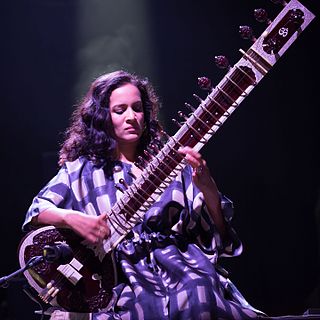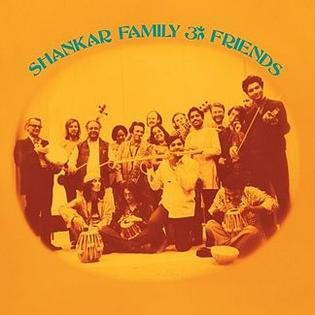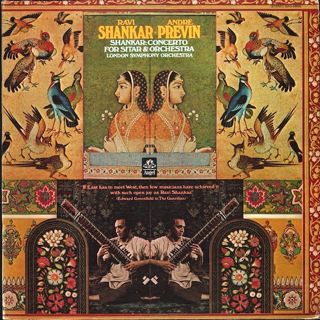See also
- West Meets East, 1967 studio album by Yehudi Menuhin and Ravi Shankar
- West Meets East, Volume 2, 1968 studio album by Yehudi Menuhin and Ravi Shankar
East Meets West may refer to:

Yehudi Menuhin, Baron Menuhin, was an American-born British violinist and conductor who spent most of his performing career in Britain. He is widely considered one of the greatest violinists of the 20th century. He played the Soil Stradivarius, considered one of the finest violins made by Italian luthier Antonio Stradivari.

Ravi Shankar was an Indian sitarist and composer. A sitar virtuoso, he became the world's best-known expert of North Indian classical music in the second half of the 20th century, and influenced many musicians in India and throughout the world. Shankar was awarded India's highest civilian honour, the Bharat Ratna, in 1999. He is also the father of American singer Norah Jones.

Ali Akbar Khan was an Indian Hindustani classical musician of the Maihar gharana, known for his virtuosity in playing the sarod. Trained as a classical musician and instrumentalist by his father, Allauddin Khan, he also composed numerous classical ragas and film scores. He established a music school in Calcutta in 1956, and the Ali Akbar College of Music in 1967, which moved with him to the United States and is now based in San Rafael, California, with a branch in Basel, Switzerland.

Subramaniam Lakshminarayana is an Indian violinist, composer and conductor, trained in the classical Carnatic music tradition and Western classical music.

Anoushka Hemangini Shankar is a British-American sitar player and musician of Indian descent, as well as occasional writer. She performs across multiple genres and styles—classical and contemporary, acoustic and electronic. In addition to releasing seven solo studio albums beginning with Anoushka (1998), she has also worked alongside a wide variety of musicians, including Karsh Kale on the full-length collaboration Breathing Under Water (2007) and her father Ravi Shankar. She has received nine Grammy Awards nominations and was the first musician of Indian origin to perform live and to serve as a presenter at the ceremony. She was the youngest and first woman to receive a British House of Commons Shield.

Raga is a 1971 documentary film about the life and music of Indian sitarist Ravi Shankar, produced and directed by Howard Worth. It includes scenes featuring Western musicians Yehudi Menuhin and George Harrison, as well as footage of Shankar returning to Maihar in central India, where as a young man he trained under the mentorship of Allauddin Khan. The film also features a portion of Shankar and tabla player Alla Rakha's acclaimed performance at the 1967 Monterey Pop Festival.
John Barham is an English classical pianist, composer, arranger, producer and educator. He is best known for his orchestration of George Harrison albums such as All Things Must Pass (1970) and for his association with Indian sitar maestro Ravi Shankar.
Volume Two, Volume 2, Volume II or Vol. II may refer to:
Ravi Shankar had numerous solo recordings published, including these:

Shankar Family & Friends is an album by Indian musician Ravi Shankar, recorded primarily in Los Angeles during the spring of 1973, but not released until late 1974. It was produced by Shankar's friend George Harrison and one of the first releases on the ex-Beatle's Dark Horse label. Out of print for many years, and much sought after as a result, the album was remastered in 2010 and reissued as part of the Ravi Shankar–George Harrison box set Collaborations.

Chants of India is an album by Indian musician Ravi Shankar released in 1997 on Angel Records. Produced by his friend and sometime collaborator George Harrison, the album consists of Vedic and other Hindu sacred prayers set to music, marking a departure from Shankar's more familiar work in the field of Hindustani classical music. The lyrical themes of the recorded chants are peace and harmony among nature and all creatures. Sessions for the album took place in the Indian city of Madras and at Harrison's home in Henley-on-Thames, Oxfordshire, following his work on The Beatles' Anthology (1995). Anoushka Shankar, John Barham, Bikram Ghosh, Tarun Bhatacharaya and Ronu Majumdar are among the many musicians who contributed to the recording.

West Meets East is an album by American violinist Yehudi Menuhin and Indian sitar virtuoso Ravi Shankar, released in Britain in January 1967. It was recorded following their successful duet in June 1966 at the Bath Musical Festival, where they had played some of the same material.

Music of India: Morning and Evening Ragas is the debut album by Indian sarod master Ali Akbar Khan, released in 1955. Issued on Angel Records, it is considered a landmark recording, being the first album of Indian classical music ever released.

West Meets East, Volume 2 is an album by American violinist Yehudi Menuhin and Indian sitar virtuoso Ravi Shankar, released in 1968. It is the second album in a trilogy of collaborations between the two artists, after the Grammy Award-winning West Meets East (1967).
Kamala Chakravarty is an Indian classical musician and former dancer, known for her association with sitar maestro Ravi Shankar. From 1967 until the late 1970s, she accompanied Shankar, in the role of tambura player and singer, in a number of acclaimed performances, including the Monterey International Pop Festival (1967), his Human Rights Day duet with violinist Yehudi Menuhin (1967), the Concert for Bangladesh (1971) and the Music Festival from India (1974). She lived with Shankar as his "wife" from 1967 to 1981, while he was still married to musician and teacher Annapurna Devi.
The Asian Music Circle was an organisation founded in London, England, in 1946, that promoted Indian and other Asian styles of music, dance and culture in the West. The AMC is credited with having facilitated the assimilation of the Indian subcontinent's artistic traditions into mainstream British culture. Founded by Indian writer and former political activist Ayana Angadi and his English wife, Patricia Fell-Clarke, a painter and later a novelist, the organisation was run from their family home in the north London suburb of Finchley.

Tana Mana is an album by Indian musician Ravi Shankar, originally credited to "the Ravi Shankar Project" and released in 1987. The album is an experimental work by Shankar, mixing traditional instrumentation with 1980s electronic music and sampling technology. Shankar recorded much of Tana Mana in 1983 with sound effects innovator Frank Serafine, but it remained unreleased until Peter Baumann, head of new age record label Private Music, became attached to the project. The album title translates to mean "body and mind".

Ravi Shankar: In Celebration is a compilation box set by Indian classical musician and composer Ravi Shankar, released in 1996 on Angel Records in conjunction with Dark Horse Records. The four discs cover Shankar's international career, from the 1950s to the mid 1990s, and include recordings originally released on the World Pacific, HMV, Angel, Apple, Dark Horse and Private Music record labels. Shankar's friend George Harrison compiled and co-produced the set, which was issued as part of year-long celebrations for Shankar's 75th birthday.
Sakar Khan (1938–2013) was an Indian musician, considered by many as the greatest exponent of the Kamayacha, a Rajasthani version of the Persian musical instrument of the same name, popular among the Manganiar community of the Indian desert state. The Government of India honoured Khan in 2012, with the fourth highest civilian award of Padma Shri.

Concerto for Sitar & Orchestra is a studio album by Indian musician and composer Ravi Shankar with the London Symphony Orchestra (LSO) conducted by André Previn. The concerto was premiered at London's Royal Festival Hall on 28 January 1971, and subsequently released in Britain and America.